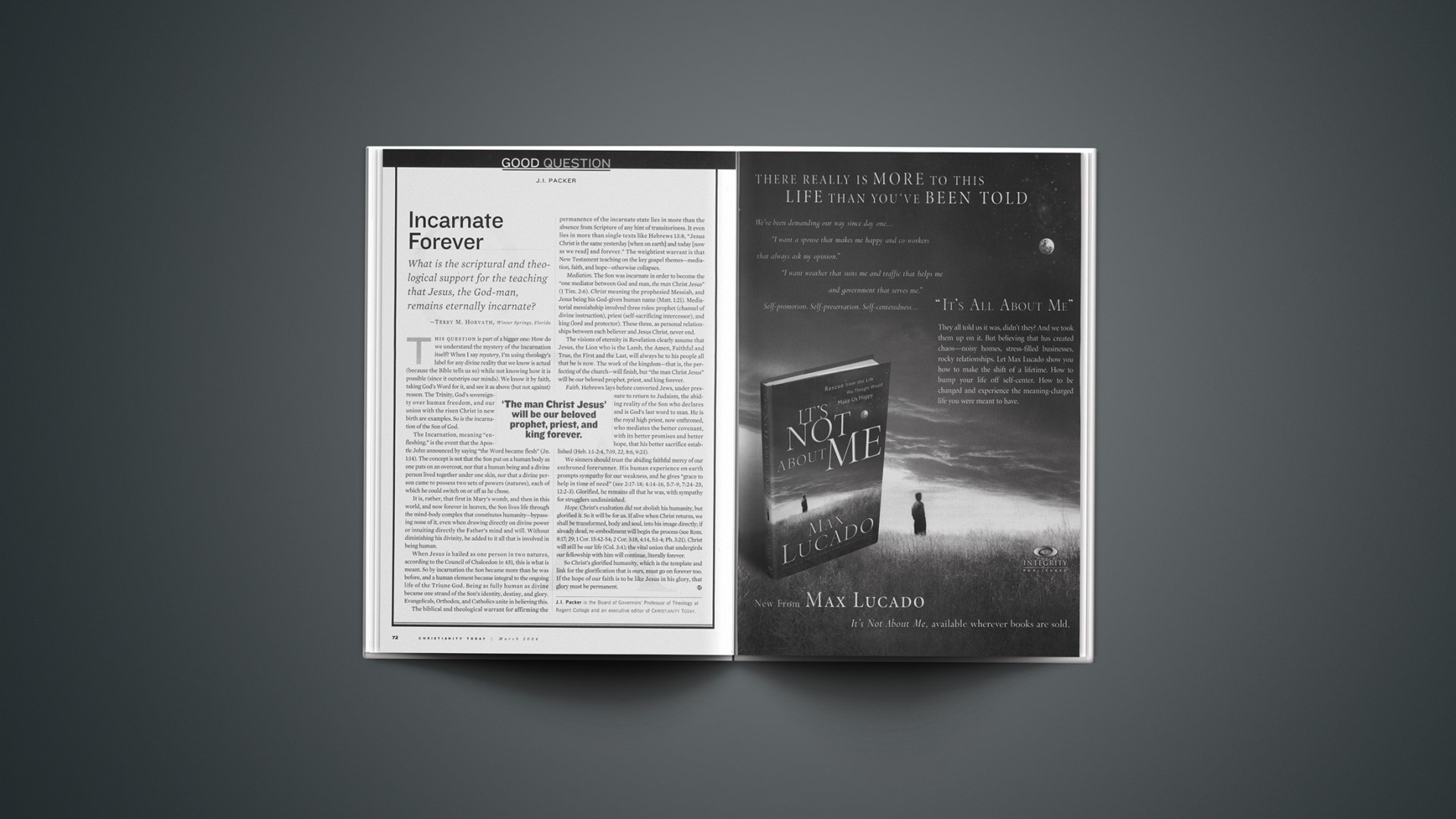What is the scriptural and theological support for the teaching that Jesus, the God-man, remains eternally incarnate?
—Terry M. Horvath, Winter Springs, Florida
This question is part of a bigger one: How do we understand the mystery of the Incarnation itself? When I say mystery, I'm using theology's label for any divine reality that we know is actual (because the Bible tells us so) while not knowing how it is possible (since it outstrips our minds). We know it by faith, taking God's Word for it, and see it as above (but not against) reason. The Trinity, God's sovereignty over human freedom, and our union with the risen Christ in new birth are examples. So is the incarnation of the Son of God.
The Incarnation, meaning "enfleshing," is the event that the Apostle John announced by saying "the Word became flesh" (Jn. 1:14). The concept is not that the Son put on a human body as one puts on an overcoat, nor that a human being and a divine person lived together under one skin, nor that a divine person came to possess two sets of powers (natures), each of which he could switch on or off as he chose.
It is, rather, that first in Mary's womb, and then in this world, and now forever in heaven, the Son lives life through the mind-body complex that constitutes humanity—bypassing none of it, even when drawing directly on divine power or intuiting directly the Father's mind and will. Without diminishing his divinity, he added to it all that is involved in being human.
When Jesus is hailed as one person in two natures, according to the Council of Chalcedon in 451, this is what is meant. So by incarnation the Son became more than he was before, and a human element became integral to the ongoing life of the Triune God. Being as fully human as divine became one strand of the Son's identity, destiny, and glory. Evangelicals, Orthodox, and Catholics unite in believing this.
The biblical and theological warrant for affirming the permanence of the incarnate state lies in more than the absence from Scripture of any hint of transitoriness. It even lies in more than single texts like Hebrews 13:8, "Jesus Christ is the same yesterday [when on earth] and today [now as we read] and forever." The weightiest warrant is that New Testament teaching on the key gospel themes—mediation, faith, and hope—otherwise collapses.
Mediation. The Son was incarnate in order to become the "one mediator between God and man, the man Christ Jesus" (1 Tim. 2:6). Christ meaning the prophesied Messiah, and Jesus being his God-given human name (Matt. 1:21). Mediatorial messiahship involved three roles: prophet (channel of divine instruction), priest (self-sacrificing intercessor), and king (lord and protector). These three, as personal relationships between each believer and Jesus Christ, never end.
The visions of eternity in Revelation clearly assume that Jesus, the Lion who is the Lamb, the Amen, Faithful and True, the First and the Last, will always be to his people all that he is now. The work of the kingdom—that is, the perfecting of the church—will finish, but "the man Christ Jesus" will be our beloved prophet, priest, and king forever.
Faith. Hebrews lays before converted Jews, under pressure to return to Judaism, the abiding reality of the Son who declares and is God's last word to man. He is the royal high priest, now enthroned, who mediates the better covenant, with its better promises and better hope, that his better sacrifice established (Heb. 1:1-2:4, 7:19, 22, 8:6, 9:23).
We sinners should trust the abiding faithful mercy of our enthroned forerunner. His human experience on earth prompts sympathy for our weakness, and he gives "grace to help in time of need" (see ). Glorified, he remains all that he was, with sympathy for strugglers undiminished.
Hope. Christ's exaltation did not abolish his humanity, but glorified it. So it will be for us. If alive when Christ returns, we shall be transformed, body and soul, into his image directly; if already dead, re-embodiment will begin the process (see Rom. 8:17; 29; 1 Cor. 15:42-54 2 Cor. 3:18 2 Cor. 4:14; 2 Cor. 5:1-4; Ph. 3:21). Christ will still be our life (Col. 3:4); the vital union that undergirds our fellowship with him will continue, literally forever.
So Christ's glorified humanity, which is the template and link for the glorification that is ours, must go on forever too. If the hope of our faith is to be like Jesus in his glory, that glory must be permanent.
J.I. Packer is the Board of Governors' Professor of Theology at Regent College and an executive editor of Christianity Today.










